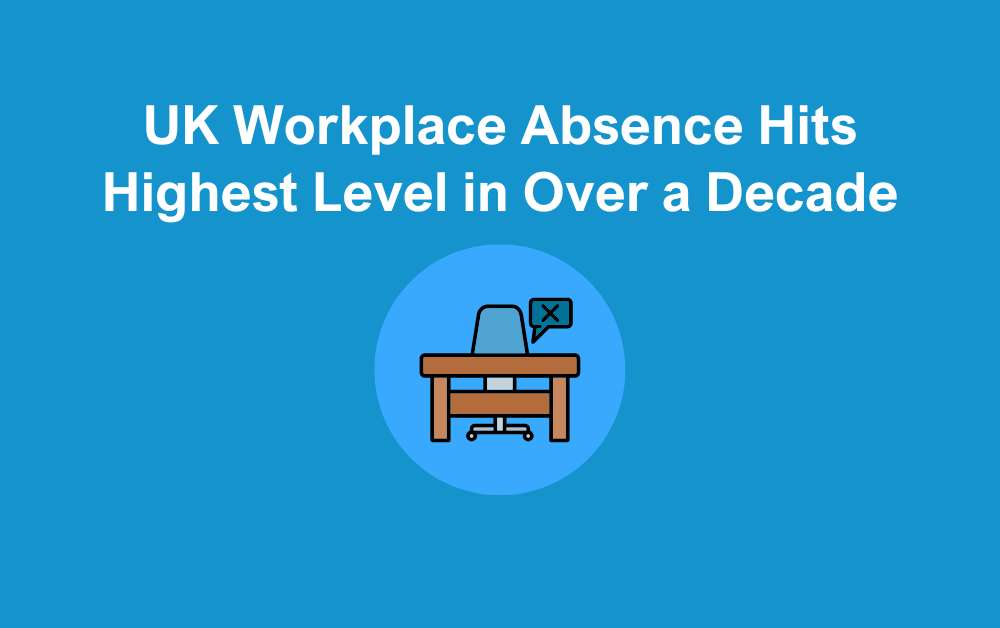New research from the CIPD and Simplyhealth has revealed a sharp rise in workplace absence across UK workplaces. Employees were off sick for an average of 9.4 days over the last 12 months – the equivalent of nearly two full working weeks.
To put this into context:
- Pre-pandemic levels sat at 5.8 days
- By 2023, the figure had risen to 7.8 days
- In 2025, absence has climbed again to 9.4 days
This latest data, based on a survey of over 1,100 employers, highlights an urgent need for organisations to rethink how they support employee health and wellbeing.
What’s driving this rise in absence?
The findings show that absence is increasingly linked to long-term health conditions. According to the government’s Keep Britain Working review, around 8.7 million people in the UK are now living with a work-limiting condition.
Employers identified the main causes of workplace absence as:
Long-term absence (four weeks or more):
- Mental ill health, such as anxiety or depression (41%)
- Musculoskeletal injuries, such as back pain (31%)
- Long-term health conditions, such as cancer (30%)
Short-term absence (up to four weeks):
- Minor illnesses such as colds and flu (78%)
- Mental ill health (29%)
- Stress (26%)
- Caring responsibilities for children (26%)
The employer response – why action is needed
The report urges employers to go beyond reactive workplace absence management and take a proactive approach. This includes:
- Addressing job design so that work does not contribute to poor health
- Recognising the impact of both physical and mental ill health
- Creating supportive workplace cultures where employees feel able to manage their health
- Providing effective adjustments and support for employees with long-term conditions
Why every business needs a clear absence policy
A well-structured workplace absence policy is the foundation of effective absence management. It sets clear expectations for employees, ensures consistency across the business, and provides managers with a framework to follow.
Your absence policy should:
- Outline reporting procedures when an employee is off sick
- Explain how absences will be recorded and monitored
- Detail the process for return to work interviews
- Include guidance on how long-term absence will be managed
- Highlight the support available to employees
Without a robust policy in place, businesses run the risk of inconsistent management, higher absence levels, and potential legal challenges.
The role of return to work interviews
One of the most effective – yet often overlooked – tools for managing absence is the return to work interview. These conversations should take place on the employee’s first day back and serve multiple purposes:
- Welcoming the employee back and showing genuine care
- Identifying whether there are any underlying issues impacting attendance
- Reinforcing the organisation’s policies and expectations
- Reducing the likelihood of recurring short-term absences
- Opening the door to additional support if needed
When handled correctly, return to work interviews demonstrate that workplace absence is taken seriously but also show that employees are valued and supported.
Providing the right support for employees
Rising absence levels highlight the need for businesses to go beyond monitoring – they must create environments where employees feel supported in managing their health. This can include:
- Access to employee assistance programmes (EAPs)
- Mental health first aiders and training for managers
- Workplace adjustments for employees with long-term conditions
- Flexible working arrangements to balance health and personal responsibilities
- Proactive wellbeing initiatives to prevent health issues developing in the first place
When employees feel supported, they are more likely to stay engaged, recover more quickly, and remain loyal to the organisation.
Do you know the true cost of absence in your business?
Workplace absence doesn’t just affect individuals – it impacts productivity, team morale, customer service, and ultimately the bottom line. Yet many organisations underestimate just how much it costs them each year.
By tracking absence data, conducting return to work interviews, and ensuring managers are confident in applying policies fairly, businesses can significantly reduce lost time and improve performance.
Why partner with The HR Booth?
At The HR Booth, we specialise in helping organisations manage sickness absence effectively. We understand that many businesses – and even in-house HR teams – are stretched, and the rise in absence can be challenging to manage.
We work with employers to:
- Develop and implement robust absence policies
- Train managers to carry out effective return to work interviews
- Provide practical advice on supporting employees with long-term conditions
- Create healthier workplace cultures that reduce absence and improve engagement
- Help calculate the true cost of absence and put strategies in place to reduce it
Our team combines expert HR knowledge with real-world experience of working alongside SMEs across the UK. That means we’re not just offering theory – we provide practical, actionable solutions that make a difference.
If you’re concerned about workplace absence levels in your business or want to strengthen how you support employee wellbeing, The HR Booth is here to help.







